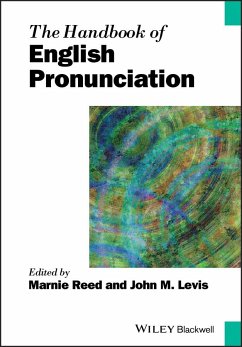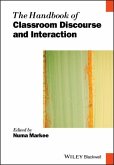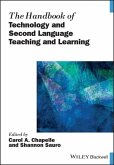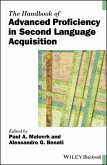Marnie Reed, John M. Levis
The Handbook of English Pronunciation
Herausgeber: Reed, Marnie; Levis, John M
Marnie Reed, John M. Levis
The Handbook of English Pronunciation
Herausgeber: Reed, Marnie; Levis, John M
- Broschiertes Buch
- Merkliste
- Auf die Merkliste
- Bewerten Bewerten
- Teilen
- Produkt teilen
- Produkterinnerung
- Produkterinnerung
The Handbook of English Pronunciation presents a comprehensive exploration of English pronunciation with essential topics for applied linguistics researchers and teachers, including language acquisition, varieties of English, historical perspectives, accent's changing role, and connections to discourse, technology, and pedagogy. _ Provides thorough descriptions of all elements of English pronunciation _ Features contributions from a global list of authors, reflecting the finest scholarship available _ Explores a careful balance of issues and topics important to both researchers and teachers _…mehr
Andere Kunden interessierten sich auch für
![The Handbook of English Pronunciation The Handbook of English Pronunciation]() Marnie ReedThe Handbook of English Pronunciation234,99 €
Marnie ReedThe Handbook of English Pronunciation234,99 €![The Handbook of Classroom Discourse and Interaction The Handbook of Classroom Discourse and Interaction]() Numa MarkeeThe Handbook of Classroom Discourse and Interaction68,99 €
Numa MarkeeThe Handbook of Classroom Discourse and Interaction68,99 €![The Handbook of Technology and Second Language Teaching and Learning The Handbook of Technology and Second Language Teaching and Learning]() The Handbook of Technology and Second Language Teaching and Learning239,99 €
The Handbook of Technology and Second Language Teaching and Learning239,99 €![The Handbook of Technology and Second Language Teaching and Learning The Handbook of Technology and Second Language Teaching and Learning]() The Handbook of Technology and Second Language Teaching and Learning61,99 €
The Handbook of Technology and Second Language Teaching and Learning61,99 €![The Handbook of Classroom Discourse and Interaction The Handbook of Classroom Discourse and Interaction]() Numa MarkeeThe Handbook of Classroom Discourse and Interaction239,99 €
Numa MarkeeThe Handbook of Classroom Discourse and Interaction239,99 €![Applied Linguistics Applied Linguistics]() Applied Linguistics38,99 €
Applied Linguistics38,99 €![The Handbook of Advanced Proficiency in Second Language Acquisition The Handbook of Advanced Proficiency in Second Language Acquisition]() The Handbook of Advanced Proficiency in Second Language Acquisition248,99 €
The Handbook of Advanced Proficiency in Second Language Acquisition248,99 €-
-
-
The Handbook of English Pronunciation presents a comprehensive exploration of English pronunciation with essential topics for applied linguistics researchers and teachers, including language acquisition, varieties of English, historical perspectives, accent's changing role, and connections to discourse, technology, and pedagogy.
_ Provides thorough descriptions of all elements of English pronunciation
_ Features contributions from a global list of authors, reflecting the finest scholarship available
_ Explores a careful balance of issues and topics important to both researchers and teachers
_ Provides a historical understanding of the importance of pronunciation and examines some of the major ways English is pronounced today throughout the world
_ Considers practical concerns about how research and practice interact in teaching pronunciation in the classroom
Hinweis: Dieser Artikel kann nur an eine deutsche Lieferadresse ausgeliefert werden.
_ Provides thorough descriptions of all elements of English pronunciation
_ Features contributions from a global list of authors, reflecting the finest scholarship available
_ Explores a careful balance of issues and topics important to both researchers and teachers
_ Provides a historical understanding of the importance of pronunciation and examines some of the major ways English is pronounced today throughout the world
_ Considers practical concerns about how research and practice interact in teaching pronunciation in the classroom
Hinweis: Dieser Artikel kann nur an eine deutsche Lieferadresse ausgeliefert werden.
Produktdetails
- Produktdetails
- Blackwell Handbooks in Linguistics
- Verlag: Wiley & Sons / Wiley-Blackwell
- Artikelnr. des Verlages: 1A119055260
- 1. Auflage
- Seitenzahl: 560
- Erscheinungstermin: 12. Februar 2019
- Englisch
- Abmessung: 241mm x 170mm x 25mm
- Gewicht: 828g
- ISBN-13: 9781119055266
- ISBN-10: 1119055261
- Artikelnr.: 50117161
- Herstellerkennzeichnung
- Libri GmbH
- Europaallee 1
- 36244 Bad Hersfeld
- 06621 890
- Blackwell Handbooks in Linguistics
- Verlag: Wiley & Sons / Wiley-Blackwell
- Artikelnr. des Verlages: 1A119055260
- 1. Auflage
- Seitenzahl: 560
- Erscheinungstermin: 12. Februar 2019
- Englisch
- Abmessung: 241mm x 170mm x 25mm
- Gewicht: 828g
- ISBN-13: 9781119055266
- ISBN-10: 1119055261
- Artikelnr.: 50117161
- Herstellerkennzeichnung
- Libri GmbH
- Europaallee 1
- 36244 Bad Hersfeld
- 06621 890
Marnie Reed is Professor of Education and affiliated faculty in the Program in Applied Linguistics at Boston University, USA. She is also Director of the graduate program in Teaching English to Speakers of Other Languages (TESOL) in the School of Education, where she teaches courses in linguistics, second language acquisition, and applied phonetics and phonology. John M. Levis is Angela B. Pavitt Professor of English in the Applied Linguistics and TESL program at Iowa State University, USA. He specializes in the teaching of pronunciation and oral communication, phonetics and phonology, introductory linguistics, dialects in American literature, and technology and oral communication.
Notes on Contributors vii
Introduction xii
Part I The History of English Pronunciation 1
1 The Historical Evolution of English Pronunciation 3
Jeremy Smith
2 Accent as a Social Symbol 19
Lynda Mugglestone
3 History of ESL Pronunciation Teaching 36
John M. Murphy and Amanda A. Baker
Part II Describing English Pronunciation 67
4 Segmentals 69
David Deterding
5 Syllable Structure 85
Adam Brown
6 Lexical Stress in English Pronunciation 106
Anne Cutler
7 The Rhythmic Patterning of English(es): Implications for Pronunciation Teaching 125
Ee-Ling Low
8 English Intonation - Form and Meaning 139
John M. Levis and Anne Wichmann
Part III Pronunciation and Discourse 157
9 Connected Speech 159
Ghinwa Alameen and John M. Levis
10 Functions of Intonation in Discourse 175
Anne Wichmann
11 Pronunciation and the Analysis of Discourse 190
Beatrice Szczepek Reed
12 Fluency 209
Ron I. Thomson
Part IV Pronunciation of the Major Varieties of English 227
13 North American English 229
Charles Boberg
14 British English 251
Clive Upton
15 Australian and New Zealand English 269
Laurie Bauer
16 The Pronunciation of English in South Africa 286
Ian Bekker and Bertus van Rooy
17 Indian English Pronunciation 301
Pramod Pandey
18 Pronunciation and World Englishes 320
Cecil L. Nelson and Seong-Yoon Kang
Part V Pronunciation and Language Acquisition 331
19 Acquisition of the English Sound System 333
Marilyn May Vihman
20 Variables Affecting L2 Pronunciation Development 353
Pavel Trofimovich, Sara Kennedy and Jennifer Ann Foote
Part VI Pronunciation Teaching 375
21 Intelligibility in Research and Practice: Teaching Priorities 377
Murray J. Munro and Tracey M. Derwing
22 The Segmental/Suprasegmental Debate 397
Beth Zielinski
23 Applying Theories of Language and Learning to Teaching Pronunciation 413
Graeme Couper
24 The Pronunciation of English as a Lingua Franca 433
Robin Walker and Wafa Zoghbor
25 Intonation in Research and Practice: The Importance of Metacognition 454
Marnie Reed and Christina Michaud
26 Integrating Pronunciation into the Language Classroom 471
Laura Sicola and Isabelle Darcy
27 Using Orthography to Teach Pronunciation 488
Wayne B. Dickerson
28 Technology and Learning Pronunciation 505
Rebecca Hincks
Index 520
Introduction xii
Part I The History of English Pronunciation 1
1 The Historical Evolution of English Pronunciation 3
Jeremy Smith
2 Accent as a Social Symbol 19
Lynda Mugglestone
3 History of ESL Pronunciation Teaching 36
John M. Murphy and Amanda A. Baker
Part II Describing English Pronunciation 67
4 Segmentals 69
David Deterding
5 Syllable Structure 85
Adam Brown
6 Lexical Stress in English Pronunciation 106
Anne Cutler
7 The Rhythmic Patterning of English(es): Implications for Pronunciation Teaching 125
Ee-Ling Low
8 English Intonation - Form and Meaning 139
John M. Levis and Anne Wichmann
Part III Pronunciation and Discourse 157
9 Connected Speech 159
Ghinwa Alameen and John M. Levis
10 Functions of Intonation in Discourse 175
Anne Wichmann
11 Pronunciation and the Analysis of Discourse 190
Beatrice Szczepek Reed
12 Fluency 209
Ron I. Thomson
Part IV Pronunciation of the Major Varieties of English 227
13 North American English 229
Charles Boberg
14 British English 251
Clive Upton
15 Australian and New Zealand English 269
Laurie Bauer
16 The Pronunciation of English in South Africa 286
Ian Bekker and Bertus van Rooy
17 Indian English Pronunciation 301
Pramod Pandey
18 Pronunciation and World Englishes 320
Cecil L. Nelson and Seong-Yoon Kang
Part V Pronunciation and Language Acquisition 331
19 Acquisition of the English Sound System 333
Marilyn May Vihman
20 Variables Affecting L2 Pronunciation Development 353
Pavel Trofimovich, Sara Kennedy and Jennifer Ann Foote
Part VI Pronunciation Teaching 375
21 Intelligibility in Research and Practice: Teaching Priorities 377
Murray J. Munro and Tracey M. Derwing
22 The Segmental/Suprasegmental Debate 397
Beth Zielinski
23 Applying Theories of Language and Learning to Teaching Pronunciation 413
Graeme Couper
24 The Pronunciation of English as a Lingua Franca 433
Robin Walker and Wafa Zoghbor
25 Intonation in Research and Practice: The Importance of Metacognition 454
Marnie Reed and Christina Michaud
26 Integrating Pronunciation into the Language Classroom 471
Laura Sicola and Isabelle Darcy
27 Using Orthography to Teach Pronunciation 488
Wayne B. Dickerson
28 Technology and Learning Pronunciation 505
Rebecca Hincks
Index 520
Table of Contents Notes on Contributors Introduction A. The History of English Pronunciation 1. The historical evolution of English pronunciation (Jeremy Smith
UK) 2. Accent as a social symbol (Lynda Mugglestone
UK) 3. History of ESL Pronunciation Teaching (John Murphy
US and Amanda Baker
Australia) B. Describing English Pronunciation 4. Segmentals (David Deterding
Brunei) 5. Syllable structure (Adam Brown
New Zealand) 6. Lexical stress in English pronunciation (Anne Cutler
The Netherlands) 7. The Rhythmic Patterning of English(es): Implications for Pronunciation Teaching (Ee Ling Low
Singapore) 8. English Intonation - Form and Meaning (Anne Wichmann
UK and John Levis
US) C. Pronunciation and Discourse 9. Connected speech (Ghinwa Alameen
Syria and John Levis
US) 10. Functions of intonation in discourse (Anne Wichmann
UK) 11. Pronunciation in the analysis of discourse (Beatrice Szczepek Reed
UK) 12. Fluency (Ron Thomson
Brock University
Canada) D. Pronunciation of the major varieties of English 13. North American English (Charles Boberg
Canada) 14. British English (Clive Upton
UK) 15. Australian/New Zealand English (Laurie Bauer
New Zealand) 16. The Pronunciation of English in South Africa (Ian Bekker
Zambia and Albertus van Rooy
Zambia) 17. Indian English Pronounciation (Pramod Pandey
India) 18. Pronunciation and World Englishes (Cecil Nelson
US and Seong-Yoon Kang
South Korea) E. Pronunciation and language acquisition 19. The acquisition of the English Sound System (Marilyn Vihman
UK) 20. Variables affecting L2 pronunciation development (Pavel Trofimovich
Sara Kennedy
Jennifer Anne Foote
Canada) F. Pronunciation Teaching 21. Intelligibility in Research and Practice: Teaching Priorities (Tracey Derwing and Murray Munro
Canada) 22. The Segmental/Suprasegmental Debate (Beth Zielinski
Australia) 23. Applying theories of learning and language to teaching pronunciation (Graeme Couper
New Zealand) 24. The pronunciation of English as a Lingua Franca (Robin Walker
Spain and Wafa Zoghbor
UAE) 25. Intonation in research and practice: The importance of metacognition (Marnie Reed and Christina Michaud
US) 26. Integrating pronunciation into the language classroom (Isabelle Darcy and Laura Sicola
US) 27. Using orthography to teach pronunciation (Wayne Dickerson
US) 28. Technology and learning pronunciation (Rebecca Hincks
Sweden) Index
UK) 2. Accent as a social symbol (Lynda Mugglestone
UK) 3. History of ESL Pronunciation Teaching (John Murphy
US and Amanda Baker
Australia) B. Describing English Pronunciation 4. Segmentals (David Deterding
Brunei) 5. Syllable structure (Adam Brown
New Zealand) 6. Lexical stress in English pronunciation (Anne Cutler
The Netherlands) 7. The Rhythmic Patterning of English(es): Implications for Pronunciation Teaching (Ee Ling Low
Singapore) 8. English Intonation - Form and Meaning (Anne Wichmann
UK and John Levis
US) C. Pronunciation and Discourse 9. Connected speech (Ghinwa Alameen
Syria and John Levis
US) 10. Functions of intonation in discourse (Anne Wichmann
UK) 11. Pronunciation in the analysis of discourse (Beatrice Szczepek Reed
UK) 12. Fluency (Ron Thomson
Brock University
Canada) D. Pronunciation of the major varieties of English 13. North American English (Charles Boberg
Canada) 14. British English (Clive Upton
UK) 15. Australian/New Zealand English (Laurie Bauer
New Zealand) 16. The Pronunciation of English in South Africa (Ian Bekker
Zambia and Albertus van Rooy
Zambia) 17. Indian English Pronounciation (Pramod Pandey
India) 18. Pronunciation and World Englishes (Cecil Nelson
US and Seong-Yoon Kang
South Korea) E. Pronunciation and language acquisition 19. The acquisition of the English Sound System (Marilyn Vihman
UK) 20. Variables affecting L2 pronunciation development (Pavel Trofimovich
Sara Kennedy
Jennifer Anne Foote
Canada) F. Pronunciation Teaching 21. Intelligibility in Research and Practice: Teaching Priorities (Tracey Derwing and Murray Munro
Canada) 22. The Segmental/Suprasegmental Debate (Beth Zielinski
Australia) 23. Applying theories of learning and language to teaching pronunciation (Graeme Couper
New Zealand) 24. The pronunciation of English as a Lingua Franca (Robin Walker
Spain and Wafa Zoghbor
UAE) 25. Intonation in research and practice: The importance of metacognition (Marnie Reed and Christina Michaud
US) 26. Integrating pronunciation into the language classroom (Isabelle Darcy and Laura Sicola
US) 27. Using orthography to teach pronunciation (Wayne Dickerson
US) 28. Technology and learning pronunciation (Rebecca Hincks
Sweden) Index
Notes on Contributors vii
Introduction xii
Part I The History of English Pronunciation 1
1 The Historical Evolution of English Pronunciation 3
Jeremy Smith
2 Accent as a Social Symbol 19
Lynda Mugglestone
3 History of ESL Pronunciation Teaching 36
John M. Murphy and Amanda A. Baker
Part II Describing English Pronunciation 67
4 Segmentals 69
David Deterding
5 Syllable Structure 85
Adam Brown
6 Lexical Stress in English Pronunciation 106
Anne Cutler
7 The Rhythmic Patterning of English(es): Implications for Pronunciation Teaching 125
Ee-Ling Low
8 English Intonation - Form and Meaning 139
John M. Levis and Anne Wichmann
Part III Pronunciation and Discourse 157
9 Connected Speech 159
Ghinwa Alameen and John M. Levis
10 Functions of Intonation in Discourse 175
Anne Wichmann
11 Pronunciation and the Analysis of Discourse 190
Beatrice Szczepek Reed
12 Fluency 209
Ron I. Thomson
Part IV Pronunciation of the Major Varieties of English 227
13 North American English 229
Charles Boberg
14 British English 251
Clive Upton
15 Australian and New Zealand English 269
Laurie Bauer
16 The Pronunciation of English in South Africa 286
Ian Bekker and Bertus van Rooy
17 Indian English Pronunciation 301
Pramod Pandey
18 Pronunciation and World Englishes 320
Cecil L. Nelson and Seong-Yoon Kang
Part V Pronunciation and Language Acquisition 331
19 Acquisition of the English Sound System 333
Marilyn May Vihman
20 Variables Affecting L2 Pronunciation Development 353
Pavel Trofimovich, Sara Kennedy and Jennifer Ann Foote
Part VI Pronunciation Teaching 375
21 Intelligibility in Research and Practice: Teaching Priorities 377
Murray J. Munro and Tracey M. Derwing
22 The Segmental/Suprasegmental Debate 397
Beth Zielinski
23 Applying Theories of Language and Learning to Teaching Pronunciation 413
Graeme Couper
24 The Pronunciation of English as a Lingua Franca 433
Robin Walker and Wafa Zoghbor
25 Intonation in Research and Practice: The Importance of Metacognition 454
Marnie Reed and Christina Michaud
26 Integrating Pronunciation into the Language Classroom 471
Laura Sicola and Isabelle Darcy
27 Using Orthography to Teach Pronunciation 488
Wayne B. Dickerson
28 Technology and Learning Pronunciation 505
Rebecca Hincks
Index 520
Introduction xii
Part I The History of English Pronunciation 1
1 The Historical Evolution of English Pronunciation 3
Jeremy Smith
2 Accent as a Social Symbol 19
Lynda Mugglestone
3 History of ESL Pronunciation Teaching 36
John M. Murphy and Amanda A. Baker
Part II Describing English Pronunciation 67
4 Segmentals 69
David Deterding
5 Syllable Structure 85
Adam Brown
6 Lexical Stress in English Pronunciation 106
Anne Cutler
7 The Rhythmic Patterning of English(es): Implications for Pronunciation Teaching 125
Ee-Ling Low
8 English Intonation - Form and Meaning 139
John M. Levis and Anne Wichmann
Part III Pronunciation and Discourse 157
9 Connected Speech 159
Ghinwa Alameen and John M. Levis
10 Functions of Intonation in Discourse 175
Anne Wichmann
11 Pronunciation and the Analysis of Discourse 190
Beatrice Szczepek Reed
12 Fluency 209
Ron I. Thomson
Part IV Pronunciation of the Major Varieties of English 227
13 North American English 229
Charles Boberg
14 British English 251
Clive Upton
15 Australian and New Zealand English 269
Laurie Bauer
16 The Pronunciation of English in South Africa 286
Ian Bekker and Bertus van Rooy
17 Indian English Pronunciation 301
Pramod Pandey
18 Pronunciation and World Englishes 320
Cecil L. Nelson and Seong-Yoon Kang
Part V Pronunciation and Language Acquisition 331
19 Acquisition of the English Sound System 333
Marilyn May Vihman
20 Variables Affecting L2 Pronunciation Development 353
Pavel Trofimovich, Sara Kennedy and Jennifer Ann Foote
Part VI Pronunciation Teaching 375
21 Intelligibility in Research and Practice: Teaching Priorities 377
Murray J. Munro and Tracey M. Derwing
22 The Segmental/Suprasegmental Debate 397
Beth Zielinski
23 Applying Theories of Language and Learning to Teaching Pronunciation 413
Graeme Couper
24 The Pronunciation of English as a Lingua Franca 433
Robin Walker and Wafa Zoghbor
25 Intonation in Research and Practice: The Importance of Metacognition 454
Marnie Reed and Christina Michaud
26 Integrating Pronunciation into the Language Classroom 471
Laura Sicola and Isabelle Darcy
27 Using Orthography to Teach Pronunciation 488
Wayne B. Dickerson
28 Technology and Learning Pronunciation 505
Rebecca Hincks
Index 520
Table of Contents Notes on Contributors Introduction A. The History of English Pronunciation 1. The historical evolution of English pronunciation (Jeremy Smith
UK) 2. Accent as a social symbol (Lynda Mugglestone
UK) 3. History of ESL Pronunciation Teaching (John Murphy
US and Amanda Baker
Australia) B. Describing English Pronunciation 4. Segmentals (David Deterding
Brunei) 5. Syllable structure (Adam Brown
New Zealand) 6. Lexical stress in English pronunciation (Anne Cutler
The Netherlands) 7. The Rhythmic Patterning of English(es): Implications for Pronunciation Teaching (Ee Ling Low
Singapore) 8. English Intonation - Form and Meaning (Anne Wichmann
UK and John Levis
US) C. Pronunciation and Discourse 9. Connected speech (Ghinwa Alameen
Syria and John Levis
US) 10. Functions of intonation in discourse (Anne Wichmann
UK) 11. Pronunciation in the analysis of discourse (Beatrice Szczepek Reed
UK) 12. Fluency (Ron Thomson
Brock University
Canada) D. Pronunciation of the major varieties of English 13. North American English (Charles Boberg
Canada) 14. British English (Clive Upton
UK) 15. Australian/New Zealand English (Laurie Bauer
New Zealand) 16. The Pronunciation of English in South Africa (Ian Bekker
Zambia and Albertus van Rooy
Zambia) 17. Indian English Pronounciation (Pramod Pandey
India) 18. Pronunciation and World Englishes (Cecil Nelson
US and Seong-Yoon Kang
South Korea) E. Pronunciation and language acquisition 19. The acquisition of the English Sound System (Marilyn Vihman
UK) 20. Variables affecting L2 pronunciation development (Pavel Trofimovich
Sara Kennedy
Jennifer Anne Foote
Canada) F. Pronunciation Teaching 21. Intelligibility in Research and Practice: Teaching Priorities (Tracey Derwing and Murray Munro
Canada) 22. The Segmental/Suprasegmental Debate (Beth Zielinski
Australia) 23. Applying theories of learning and language to teaching pronunciation (Graeme Couper
New Zealand) 24. The pronunciation of English as a Lingua Franca (Robin Walker
Spain and Wafa Zoghbor
UAE) 25. Intonation in research and practice: The importance of metacognition (Marnie Reed and Christina Michaud
US) 26. Integrating pronunciation into the language classroom (Isabelle Darcy and Laura Sicola
US) 27. Using orthography to teach pronunciation (Wayne Dickerson
US) 28. Technology and learning pronunciation (Rebecca Hincks
Sweden) Index
UK) 2. Accent as a social symbol (Lynda Mugglestone
UK) 3. History of ESL Pronunciation Teaching (John Murphy
US and Amanda Baker
Australia) B. Describing English Pronunciation 4. Segmentals (David Deterding
Brunei) 5. Syllable structure (Adam Brown
New Zealand) 6. Lexical stress in English pronunciation (Anne Cutler
The Netherlands) 7. The Rhythmic Patterning of English(es): Implications for Pronunciation Teaching (Ee Ling Low
Singapore) 8. English Intonation - Form and Meaning (Anne Wichmann
UK and John Levis
US) C. Pronunciation and Discourse 9. Connected speech (Ghinwa Alameen
Syria and John Levis
US) 10. Functions of intonation in discourse (Anne Wichmann
UK) 11. Pronunciation in the analysis of discourse (Beatrice Szczepek Reed
UK) 12. Fluency (Ron Thomson
Brock University
Canada) D. Pronunciation of the major varieties of English 13. North American English (Charles Boberg
Canada) 14. British English (Clive Upton
UK) 15. Australian/New Zealand English (Laurie Bauer
New Zealand) 16. The Pronunciation of English in South Africa (Ian Bekker
Zambia and Albertus van Rooy
Zambia) 17. Indian English Pronounciation (Pramod Pandey
India) 18. Pronunciation and World Englishes (Cecil Nelson
US and Seong-Yoon Kang
South Korea) E. Pronunciation and language acquisition 19. The acquisition of the English Sound System (Marilyn Vihman
UK) 20. Variables affecting L2 pronunciation development (Pavel Trofimovich
Sara Kennedy
Jennifer Anne Foote
Canada) F. Pronunciation Teaching 21. Intelligibility in Research and Practice: Teaching Priorities (Tracey Derwing and Murray Munro
Canada) 22. The Segmental/Suprasegmental Debate (Beth Zielinski
Australia) 23. Applying theories of learning and language to teaching pronunciation (Graeme Couper
New Zealand) 24. The pronunciation of English as a Lingua Franca (Robin Walker
Spain and Wafa Zoghbor
UAE) 25. Intonation in research and practice: The importance of metacognition (Marnie Reed and Christina Michaud
US) 26. Integrating pronunciation into the language classroom (Isabelle Darcy and Laura Sicola
US) 27. Using orthography to teach pronunciation (Wayne Dickerson
US) 28. Technology and learning pronunciation (Rebecca Hincks
Sweden) Index
"This outstanding Handbook provides a comprehensive, readable and authoritative overview of the nature, learning, and teaching of pronunciation. It will be an indispensable resource for teachers, teacher educators, and researchers alike."
Jack C. Richards, University of Sydney and University of Auckland, New Zealand
Jack C. Richards, University of Sydney and University of Auckland, New Zealand








